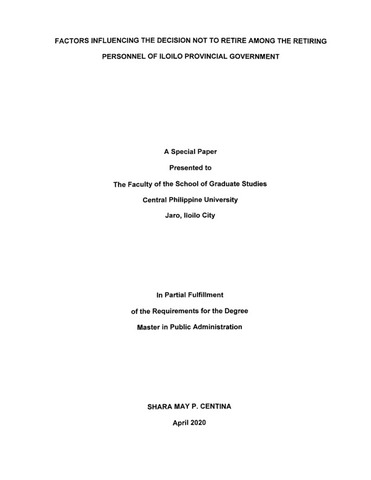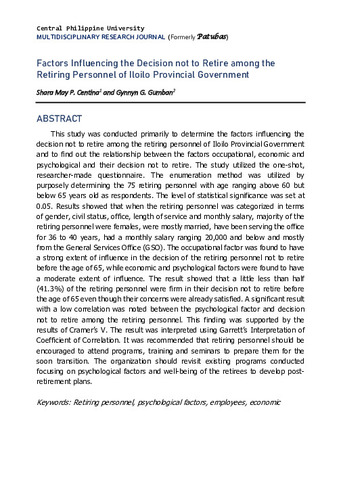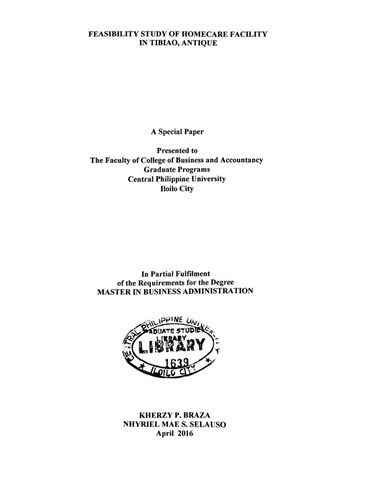| dc.description.abstract | The NCSO survey indicated that the methods used by establishments in reducing work force were voluntary resignation, early retirement and layoff/retrenchment. For the past years, there have been an increasing number of employees who retired early due to restructuring measures of companies. Among them are employees of the Aquaculture Department of Southeast Asian Fisheries Development Center (SEAFDEC/AQD) based in Tigbauan, Iloilo, Philippines. Due to budgetary constraint, the streamlining of SEAFDEC/AQD was effected by the abolition of all positions effective July 16, 2004. Rehiring of employees was subsequently initiated based on the new organizational and salary structures of which about 50 percent were rehired and the rest were rehired two years later.
How the retirees used their retirement benefits and how well they managed their investments is an interesting subject of inquiry. This study was conducted with the purpose to determine the nature and extent of utilization of retirement benefits of retired SEAFDEC/AQD employees and to determine the operating status of their businesses. There were two types of factors which were hypothesized to determine the nature and extent of utilization of retirement benefits and these were identified as personal characteristics which includes, age, sex, civil status and education and work-related characteristics which includes job category job status and net retirement benefits received.
Major findings showed that the nature of utilization of retirement benefits was categorized into personal use, personal investments and business ventures.
Almost all of the retirees utilized their retirement benefits for personal use which were expenditures for foods, medicines, clothing and investments in the form of residential lots, house construction and repair, acquisition of fixed assets and education of children. Also included was payment of debts and loans.
About three-fourths of retirees placed their benefits on investments mostly cash, cash equivalents such as fixed-term deposits, bond/equity holdings and pre-need/insurance plans.
About a third of retirees went into business. Among the businesses of retirees were retailing, franchising, fishing, farming, livestock, transportation/hauling, housing/equipment rental, catering and repair shop.
The extent of utilization of retirement benefits showed that five in every ten retirees utilized their benefits to more than 50 percent of their benefits for personal use. Three out of ten utilized their benefits to more than 50 percent of their benefits for investment and one in every ten used their benefits to more than 50 percent of their benefits on business ventures. Mean in Peso amount for personal use was P674,209 (42 percent); investment was P490,158 (30 percent) and business P459,286 (28 percent).
Among the factors that determine the nature of utilization of retirement benefits were significant for age and business ventures, educational attainment and investments and net benefits received and investments.
There was a statistically significant differences associated with the nature of utilization of retirement benefits for business related to retirees’ age. The age was categorized as those below 40 years old and 40 years and above. Among the age categories, only those retirees who were above 40 years went into business.
There was a statistically significant differences associated with the nature of utilization of retirement benefits for investments related to retirees’ education. The education was classified as those who were undergraduates, having bachelor’s degrees, and having graduate studies’ degrees. The undergraduate retirees had significant lower investments than those who were in the professional groups.
There was a statistically significant differences associated with the nature of utilization of retirement benefits for investments related to retirees’ net retirement benefits received. The net retirement benefits received was ranged from below P1M, P1M to P199,999 and over P2M. Among these ranges, retirees below P1M significantly had lower investments compared to those with higher benefit range of over P1M.
Among the factors that determine the extent of utilization of retirement benefits was significant for job category and personal use. There was a statistically significant differences associated with the extent of utilization of retirement benefits for personal use related to retirees’ job category. The job category distinguishes a rank and file, researcher and scientists. There were more rank and file retirees who utilized their benefits for personal use than the supervisory retirees (researchers and scientists).
The number of retirees who were engaged in business almost doubled as offshoot of retirement. A big portion of retirees went into retailing and franchising, followed by house/equipment rental, services and transportation services. The least was on farming, fishing and livestock.
Of the new businesses engaged by retirees, nearly a third shut down. On the other hand, there was no shut down on existing businesses of retirees prior to their retirement. Businesses of retirees with the highest number of shutdown were that of merchandising and retailing and services/others. The least was on a fishpond business.
Total amount invested by retirees for all businesses was P12.860 M. Amount lost for shut down businesses was P1.265 M. Mean amount in Peso for all business investments was P378,235 and the mean amount in Peso for businesses that were closed was P180,714.
Problems encountered by retirees in retailing business was lack or non-hands-on management of the operation, for franchise ventures, few customers, big mall rentals and inadequate support from franchise holders and for those who went into fishpond business were high pond rental and maintenance costs. Some retirees cited competition as factor that contributed to their closure.
Retirees whose businesses shut down said they had not adequately prepared for their businesses in terms of technical aspects such as making of simple business, marketing and financial plans, acquiring exposures or work experiences in a similarly situated businesses, getting information on related business such as reading of business materials or attending livelihood programs. The circumstances on their early retirement had likely influenced them to venture into business. | en_US |





